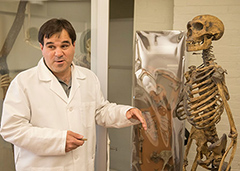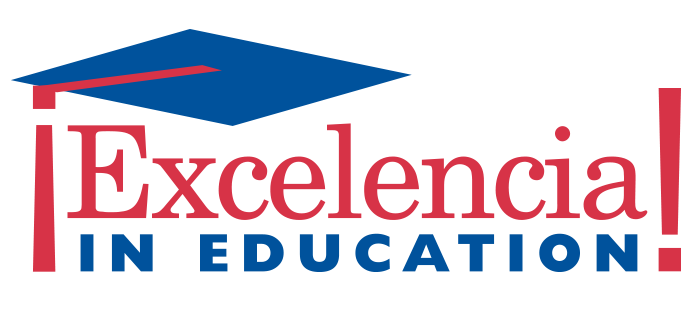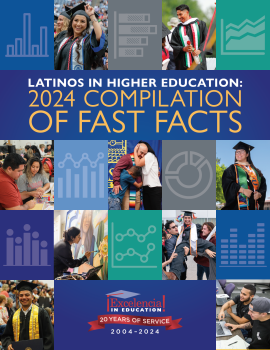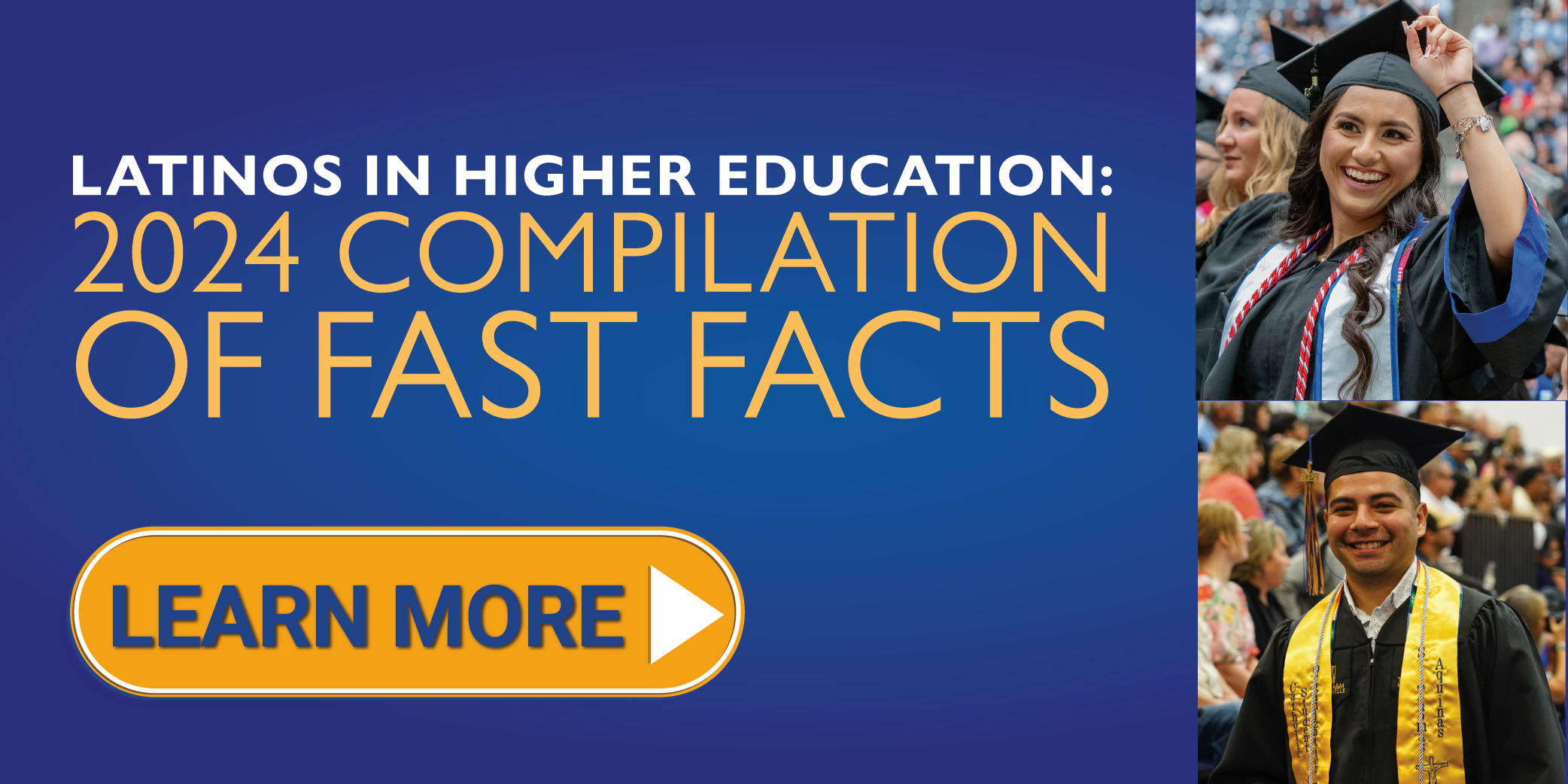Empowering students to develop research skills
February 8, 2021
This post is republished from Into Practice , a biweekly communication of Harvard’s Office of the Vice Provost for Advances in Learning

Terence D. Capellini, Richard B Wolf Associate Professor of Human Evolutionary Biology, empowers students to grow as researchers in his Building the Human Body course through a comprehensive, course-long collaborative project that works to understand the changes in the genome that make the human skeleton unique. For instance, of the many types of projects, some focus on the genetic basis of why human beings walk on two legs. This integrative “Evo-Devo” project demands high levels of understanding of biology and genetics that students gain in the first half of class, which is then applied hands-on in the second half of class. Students work in teams of 2-3 to collect their own morphology data by measuring skeletons at the Harvard Museum of Natural History and leverage statistics to understand patterns in their data. They then collect and analyze DNA sequences from humans and other animals to identify the DNA changes that may encode morphology. Throughout this course, students go from sometimes having “limited experience in genetics and/or morphology” to conducting their own independent research. This project culminates in a team presentation and a final research paper.
The benefits: Students develop the methodological skills required to collect and analyze morphological data. Using the UCSC Genome browser and other tools, students sharpen their analytical skills to visualize genomics data and pinpoint meaningful genetic changes. Conducting this work in teams means students develop collaborative skills that model academic biology labs outside class, and some student projects have contributed to published papers in the field. “Every year, I have one student, if not two, join my lab to work on projects developed from class to try to get them published.”
“The beauty of this class is that the students are asking a question that’s never been asked before and they’re actually collecting data to get at an answer.”
The challenges: Capellini observes that the most common challenge faced by students in the course is when “they have a really terrific question they want to explore, but the necessary background information is simply lacking. It is simply amazing how little we do know about human development, despite its hundreds of years of study.” Sometimes, for instance, students want to learn about the evolution, development, and genetics of a certain body part, but it is still somewhat a mystery to the field. In these cases, the teaching team (including co-instructor Dr. Neil Roach) tries to find datasets that are maximally relevant to the questions the students want to explore. Capellini also notes that the work in his class is demanding and hard, just by the nature of the work, but students “always step up and perform” and the teaching team does their best to “make it fun” and ensure they nurture students’ curiosities and questions.
Takeaways and best practices
- Incorporate previous students’ work into the course. Capellini intentionally discusses findings from previous student groups in lectures. “They’re developing real findings and we share that when we explain the project for the next groups.” Capellini also invites students to share their own progress and findings as part of class discussion, which helps them participate as independent researchers and receive feedback from their peers.
- Assign groups intentionally. Maintaining flexibility allows the teaching team to be more responsive to students’ various needs and interests. Capellini will often place graduate students by themselves to enhance their workload and give them training directly relevant to their future thesis work. Undergraduates are able to self-select into groups or can be assigned based on shared interests. “If two people are enthusiastic about examining the knee, for instance, we’ll match them together.”
- Consider using multiple types of assessments. Capellini notes that exams and quizzes are administered in the first half of the course and scaffolded so that students can practice the skills they need to successfully apply course material in the final project. “Lots of the initial examples are hypothetical,” he explains, even grounded in fiction and pop culture references, “but [students] have to eventually apply the skills they learned in addressing the hypothetical example to their own real example and the data they generate” for the Evo-Devo project. This is coupled with a paper and a presentation treated like a conference talk.
Bottom line: Capellini’s top advice for professors looking to help their own students grow as researchers is to ensure research projects are designed with intentionality and fully integrated into the syllabus. “You can’t simply tack it on at the end,” he underscores. “If you want this research project to be a substantive learning opportunity, it has to happen from Day 1.” That includes carving out time in class for students to work on it and make the connections they need to conduct research. “Listen to your students and learn about them personally” so you can tap into what they’re excited about. Have some fun in the course, and they’ll be motivated to do the work.


The importance of undergraduate research
Research as a Transferable Skill in Higher Education
- University of Brighton
Research output : Contribution to journal › Article › peer-review
Access to Document
- Rospigliosi 2014 Bourner-et-al Research as a transferable skill in HE.pdf Accepted author manuscript, 266 KB Licence: Unspecified
- https://eric.ed.gov/?id=EJ1132780
Fingerprint
- education Social Sciences 100%
- education curriculum Social Sciences 68%
- knowledge Social Sciences 42%
- graduate Social Sciences 41%
- trend Social Sciences 32%
- learning Social Sciences 22%
- student Social Sciences 16%
T1 - Research as a Transferable Skill in Higher Education
AU - Bourner, Tom
AU - Heath, Linda
AU - Rospigliosi, Asher
PY - 2014/1/1
Y1 - 2014/1/1
N2 - This paper explores the place of research training in higher education in the 21st century. It examines the changing position of research skills within higher education in recent years and looks for possible reasons for those changes.There are three main conclusions. First, training in research skills has been shifting down from doctoral programmes into Masters and increasingly into undergraduate programmes. Second, this development can be explained in terms of: a growing requirement for students to be able to plan and manage their own learning, changing trends in graduate employment; and the growth of a knowledge-based society. Third, research has become a transferable skill. The last of these conclusions has implications for the location of research within the higher education curriculum.
AB - This paper explores the place of research training in higher education in the 21st century. It examines the changing position of research skills within higher education in recent years and looks for possible reasons for those changes.There are three main conclusions. First, training in research skills has been shifting down from doctoral programmes into Masters and increasingly into undergraduate programmes. Second, this development can be explained in terms of: a growing requirement for students to be able to plan and manage their own learning, changing trends in graduate employment; and the growth of a knowledge-based society. Third, research has become a transferable skill. The last of these conclusions has implications for the location of research within the higher education curriculum.
M3 - Article
SN - 0018-1609
JO - Higher Education Review
JF - Higher Education Review

Research in Higher Education
- Open to studies using a wide range of methods, with a special interest in advanced quantitative research methods.
- Covers topics such as student access, retention, success, faculty issues, institutional assessment, and higher education policy.
- Encourages submissions from scholars in disciplines outside of higher education.
- Publishes notes of a methodological nature, literature reviews and 'research and practice' studies.
- Aims to inform decision-making in postsecondary education policy and administration.
This is a transformative journal , you may have access to funding.
- William R. Doyle,
- Lauren T. Schudde

Latest issue
Volume 65, Issue 2
Latest articles
Strategically diverse: an intersectional analysis of enrollments at u.s. law schools.
- Nicholas A. Bowman
- Frank Fernandez
- Nicholas R. Stroup

Promoting Age Inclusivity in Higher Education: Campus Practices and Perceptions by Students, Faculty, and Staff
- Susan Krauss Whitbourne
- Lauren Marshall Bowen
- Jeffrey E. Stokes

Unpacking the Gap: Socioeconomic Background and the Stratification of College Applications in the United States
- Wesley Jeffrey
- Benjamin G. Gibbs

Exploring the Interplay Between Equity Groups, Mental Health and Perceived Employability Amongst Students at a Public Australian University
- Chelsea Gill
- Adrian Gepp

Performance-Based Funding and Certificates at Public Four-Year Institutions
- Junghee Choi

Journal updates
Editorial team changes july 2023.
As of July 1, 2023, the Research in Higher Education editorial team has made several transitions
Editorial board changes - 2021
Effective 1 January 2021, the editorial board of Research in Higher Education will undergo several changes.
Editorial board changes 2011
Effective January 1, 2011, several important changes occurred with the journal Research in Higher Education.
Journal information
- Current Contents/Social & Behavioral Sciences
- Google Scholar
- OCLC WorldCat Discovery Service
- Research Papers in Economics (RePEc)
- Social Science Citation Index
- TD Net Discovery Service
- UGC-CARE List (India)
Rights and permissions
Springer policies
© Springer Nature B.V.
- Find a journal
- Publish with us
- Track your research
- Reference Manager
- Simple TEXT file
People also looked at
Editorial article, editorial: generic skills in higher education.

- 1 Centre for University Teaching and Learning (HYPE), Faculty of Educational Sciences, University of Helsinki, Helsinki, Finland
- 2 Institute for Educational Science, Professorship for Teaching and Learning in Higher Education, Justus-Liebig-University Giessen, Giessen, Germany
Editorial on the Research Topic Generic skills in higher education
Over the past decade, the importance of generic skills, such as collaboration, critical thinking, problem solving, and communication skills has gained increased interest in educational policy discourses and in practice of higher education. Previous research has shown that generic skills are related higher education students' learning processes, academic achievement as well as learning of disciplinary knowledge and skills ( Arum and Roksa, 2011 ; Tuononen et al., 2017 ; Hyytinen et al., 2021 ). Students need generic skills to construct and apply of their domain-specific knowledge and understanding ( Hyytinen et al., 2019 ). To take an example, communications skills, enable students to make their ideas and conclusions visible to others ( Braun, 2021 ; Kleemola et al., 2022 ). Together with domain-specific knowledge, generic skills are also vital in working life ( Tuononen and Hyytinen, 2022 ; Iqbal et al., 2023 ). In transition to working life, generic skills are found to be related to development of expertise ( Tuononen et al., 2017 ).
Although there is a growing consensus on the importance of generic skills, there is evidence many higher education students face challenges in generic skills. There is also a large variation in students' level of generic skills. Students' level of generic skills are associated with prior academic performance and by their socioeconomic background ( Arum and Roksa, 2011 ; Kleemola et al., 2022 ). Surprisingly little is known to what extent and how these skills develop during higher education studies. Furthermore, there are no consensus the processes of implementing generic skills in teaching and learning in programmes ( Hyytinen et al., 2019 ). Additionally, there is no unanimous agreement about what is meant by the concept of generic skills in the research community ( El Soufi and See, 2019 ). Therefore, there is a wide variety of definitions and skills that researchers consider generic skills.
This Research Topic with twelve articles from different countries and research projects advocates better understanding about learning and teaching generic skills at the context of higher education. The aim of this Research Topic is to bring together research papers covering different aspects of generic skills, including theoretical or empirical papers that explore and outline the development of generic skills in various fields of education, empirical papers that investigate the learning and teaching environments that support the learning generic skills, papers that focus on the assessment of generic skills, and systematic review related to the topic of the Research Topic. Thus, the rationale for this Research Topic is to strengthen the current state of international research on generic skills with a view to the fundamentals established so far and to bring new insights into research on generic skills. This Research Topic also contributes to discussions about the importance of generic skills in the higher education.
In this special issue, theoretical, conceptual and methodological aspects and topics are addressed, including issues related to the validation and adaptation of a performance-based assessment of generic skills (see paper by Ursin et al. , Nagel et al. ) and value of assessing tertiary students' ability to reason relationally ( Alexander et al. ). Furthermore, this Research Topic includes a review study that examines theoretical, methodological, and empirical viewpoints on learning generic skills and synthesizes the current empirical evidence about the factors that enhance and impede student learning of generic skills (see Tuononen et al. ). The majority of the articles in this Research Topic focus on learning and development of generic skills as well as what kind of role of teaching and learning environment and different learning experiences play in learning generic skills (see papers by Nielsen et al. , Räisänen et al. , Virtanen et al. , Lee and Lee , Muukkonen et al. , Slišāne et al. ). The Research Topic also offers insights into the variation and challenges is generic skills ( Kleemola et al. ) and the fit between learning opportunities for generic skills available at universities and skills required in working life ( Lohberger and Braun ). The studies use various methods from a small-scale qualitative analysis of think-aloud data to the quantitative analysis of follow-up data.
Taken together, this issue of generic skills will serve a reference for articulating future directions in research and practice in the context of higher education. The papers included in this Research Topic also highlight new perspectives for the future research. For example, intervention and longitudinal studies focusing on the development of generic skills are needed. Moreover, in order to become more coherent research field new valid research instruments to measure generic skills are required.

Author contributions
HH: draft paper preparation. TT, EB, and HH: comments and revisions. All authors approved the final version of the editorial.
Acknowledgments
We would like to thank all authors, reviewers, journal editors, and colleagues involved in preparing this special issue.
Conflict of interest
The authors declare that the research was conducted in the absence of any commercial or financial relationships that could be construed as a potential conflict of interest.
Publisher's note
All claims expressed in this article are solely those of the authors and do not necessarily represent those of their affiliated organizations, or those of the publisher, the editors and the reviewers. Any product that may be evaluated in this article, or claim that may be made by its manufacturer, is not guaranteed or endorsed by the publisher.
Arum, R., and Roksa, J. (2011). Academically Adrift: Limited Learning on College Campuses . Chicago: University of Chicago Press. doi: 10.7208/chicago/9780226028576.001.0001
CrossRef Full Text | Google Scholar
Braun, E. (2021). Performance-based assessment of students' communication skills. Int. J. Chinese Educ. 10, 1–12. doi: 10.1177/22125868211006202
El Soufi, N., and See, B. H. (2019). Does explicit teaching of critical thinking improve critical thinking skills of English language learners in higher education? A critical review of causal evidence. Stud. Educ. Eval . 60, 140–162. doi: 10.1016/j.stueduc.2018.12.006
Hyytinen, H., Toom, A., and Shavelson, R. J. (2019). “Enhancing scientific thinking through the development of critical thinking in higher education,” in Redefining Scientific Thinking for Higher Education: Higher-Order Thinking, Evidence-Based Reasoning and Research Skills , eds. M. Murtonen, and K. Balloo (Palgrave Macmillan) 59–78. doi: 10.1007/978-3-030-24215-2_3
Hyytinen, H., Ursin, J., Silvennoinen, K., Kleemola, K., and Toom, A. (2021). The Dynamic relationship between response processes and self-regulation in critical thinking assessments. Stud. Educ. Evaluat. 71, 101090. doi: 10.1016/j.stueduc.2021.101090
Iqbal, J., Shaikh, A. A., Jamal, W. N., Akhtar, K, Rahim, R., et al. (2023). Exploring the generic skills required for the employability and professional wellbeing of Pakistani Millennials: The employers' perspective. Front. Psychol . 5, 1070267. doi: 10.3389/fpsyg.2022.1070267
PubMed Abstract | CrossRef Full Text | Google Scholar
Kleemola, K., Hyytinen, H., and Toom, A. (2022). Critical thinking and writing in transition to higher education in Finland: do prior academic performance and socioeconomic background matter? Eur. J. Higher Educ . 2022, 1–21. doi: 10.1080/21568235.2022.2075417
Tuononen, T., and Hyytinen, H. (2022). Towards a successful transition to work - which employability factors contribute to early career success? J. Educ. Work. 35, 599–613. doi: 10.1080/13639080.2022.2126969
Tuononen, T., Parpala, A., and Lindblom-Ylänne, S. (2017). “The transition from university to working life. An exploration of graduates' perceptions of their academic competences,” in Higher Education Transitions: Theory and Research , eds. E. Kyndt, V. Donche, K. Trigwell, and S. Lindblom-Ylänne (London: Routledge - Taylor and Francis Group) 238–253. doi: 10.4324/9781315617367-18
Keywords: generic skill, higher education, generic skill development, assessment, teaching-learning
Citation: Hyytinen H, Tuononen T and Braun E (2023) Editorial: Generic skills in higher education. Front. Educ. 8:1162156. doi: 10.3389/feduc.2023.1162156
Received: 09 February 2023; Accepted: 28 March 2023; Published: 04 April 2023.
Edited and reviewed by: Maria J. Hernandez-Serrano , University of Salamanca, Spain
Copyright © 2023 Hyytinen, Tuononen and Braun. This is an open-access article distributed under the terms of the Creative Commons Attribution License (CC BY) . The use, distribution or reproduction in other forums is permitted, provided the original author(s) and the copyright owner(s) are credited and that the original publication in this journal is cited, in accordance with accepted academic practice. No use, distribution or reproduction is permitted which does not comply with these terms.
*Correspondence: Heidi Hyytinen, heidi.m.hyytinen@helsinki.fi
This article is part of the Research Topic
Generic Skills in Higher Education

How can we teach AI literacy skills?
Universities have made positive strides in improving digital literacy for graduates, but now they need to do the same for AI literacy
Christine O’Dea
.css-76pyzs{margin-right:0.25rem;} ,, michael o’dea.

You may also like

Popular resources
.css-1txxx8u{overflow:hidden;max-height:81px;text-indent:0px;} Emotions and learning: what role do emotions play in how and why students learn?
A diy guide to starting your own journal, universities, ai and the common good, artificial intelligence and academic integrity: striking a balance, create an onboarding programme for neurodivergent students.
A question students regularly ask me is: will AI replace human workers? I imagine many educators may be experiencing the same thing, in particular, those teaching AI or business analytics-related programmes and modules. This is not a surprise. AI, in particular generative AI, continues to be a hot topic and is becoming more prevalent in all major industries, including education. AI could automate 10-30 per cent of jobs in the UK, and more than 75 per cent of companies globally intend to adopt AI and related technologies in the next five years.
Going back to the question, a common view is that AI will change the employment landscape. It will replace some professions and create new jobs, but it will not replace humans . Human workers, nevertheless, need to upskill and adapt to work with AI and machines. Many articles offer their interpretations of the key AI skills that professionals need to learn and develop. It then becomes clear that university students need to develop AI literacy skills for the future workforces. AI literacy has already been considered a key graduate attribute for university students.
What is AI literacy?
Building from and developing upon digital literacy, AI literacy is more complex and requires users to have some fundamental understanding of technical knowledge – ie, a basic idea of how AI works, what AI does and where AI tools can be applied, and the potential social and ethical implications of AI applications. In the context of generative AI, ethics and fact-checking are particularly important, because it can create new text-, video- or audio-based materials and other creative artefacts with ease. However, we are unclear about current students’ AI literacy level , even though it has been reported that some students have used generative AI tools to help them with their studies or assessments. Therefore, how can we, educators and universities, help and support students to move from A, that is, their current state of knowledge, to B, that is to become industry-oriented AI literates? The answer is AI literacy education.
- Resource collection: AI transformers like ChatGPT are here, so what next?
- Transition from expert to guide by embracing generative AI
- Three ways to use ChatGPT to enhance students’ critical thinking in the classroom
How can we teach AI literacy?
As the name suggests, AI literacy education refers to co-curricular or extracurricular modules or courses, offered by universities, and designed specifically to develop students’ AI (including generative AI) literacy skills. These courses and modules are aimed at undergraduate and/or postgraduate students, and can be delivered at the institutional, faculty or departmental level. The University of California, for example, designed a multidisciplinary campus-wide AI curriculum for undergraduate students. It focuses on developing students’ technical and ethical skills. City, University of London introduced a similar type of AI course for postgraduate students studying radiology.
This is clearly where we should be heading, but there is a shortage of guidance and practical examples on AI literacy curriculum design and pedagogical approaches, and in particular, discipline-specific strategies for enhancing student engagement and learning within particular subject disciplines. As a result, some important questions remain unanswered. For instance:
- How should university and academic tutors design and develop AI literacy courses for specific subject disciplines?
- What types of AI literacy skills should be included in this course?
- What teaching approaches are most effective in teaching AI literacy skills?
AI literacy course design
The questions raised above are mostly related to curriculum design. If universities consider offering an AI literacy course to students, the following recommendations may be helpful:
First, it is necessary to understand students’ current AI literacy level so that the course can better address the knowledge and skill gaps and meet student expectations. You can gain an understanding of current levels by conducting an AI literacy survey . You can then use the AI literacy framework , developed by Davy Tsz Kit Ng, Jac Ka Lok Leung, Samuel Kai Wah Chu and Maggie Shen Qiao as an underpinning framework to develop an AI literacy course. This framework includes four dimensions:
- Knowledge and understanding of AI
- Use and application of AI
- Evaluation and creation of AI
- AI ethics
It also suggests the essential AI skills (both technical and non-technical) that need to be covered in the course.
Third, tutors need to consider discipline-appropriate approaches to teaching AI literacy skills. Innovative approaches such as gamification, simulations and project-based learning have proved to be effective.
And finally, the skills covered in the curriculum need to be industry-oriented. Students need plenty of hands-on opportunities to use AI tools to solve problems and deal with challenges that they may encounter in their future workforce. For example, in one of my modules, I worked with more than 300 students at King’s Business School to create a rule-based chatbot as an additional assessment support tool. Through participating in the project, students learned about the advantages and challenges of using a chatbot in customer support, and how to create such a chatbot using Google Dialogflow. They were also able to test out innovative ideas to improve the chatbot’s efficiency.
The global workforce stands on the threshold of a major change in its composition. Universities are still unsure of how to deal with these technologies and how to incorporate them into teaching and learning. However, the technology isn’t standing still, and neither is industry; AI is being adopted and incorporated into everyday working operations and this process is increasing almost daily. Universities have made positive strides in improving digital literacy for graduates, but now they need to do the same for AI literacy.
Christine O’Dea is a senior lecturer in management and technology education at King’s Business School, King’s College London. Michael O’Dea is a lecturer in computer science at the University of York.
If you would like advice and insight from academics and university staff delivered direct to your inbox each week, sign up for the Campus newsletter .
Emotions and learning: what role do emotions play in how and why students learn?
Global perspectives: navigating challenges in higher education across borders, how to help young women see themselves as coders, contextual learning: linking learning to the real world, authentic assessment in higher education and the role of digital creative technologies, how hard can it be testing ai detection tools.
Register for free
and unlock a host of features on the THE site
Tiny Tots Help Teach Real-Classroom Concepts
Monday, Apr 08, 2024 • Written by Monique Bird :

Dr. John Romig, an assistant professor of special education, recently begun inviting his young children to campus to help UTA students learn. Among the concepts, “SPED 4301: Strategies for Teaching Individuals with High Incidence Disabilities: Reading and Writing” teaches UTA students to explicitly teach basic reading and writing skills and administer curriculum-based measurements – a method of monitoring a child’s progress – as that child learns to read and write.
Often lacking children to work with, the UTA students were typically asked to practice with one another. However, starting last year with a campus visit from now 5-year-old Jack, Romig’s students can train in more meaningful ways.
“Having a real kid made the practice more authentic because he made mistakes like real kids make,” said Romig. “When they practice with each other, they don't make the mistakes that a kid would make. Because they each got to practice with him, they were able to see how his scores fluctuated from administration to administration, discuss why that might be happening, and learn about various data principles.”

The unique project is becoming a small tradition.
The latest visit in March marked Jacks’ third campus visit and 3-year-old Will’s first visit.
“Textbook reading tells me what I’m going to be doing or learning, but I don’t see how it’s going to happen in real life,” continued Tillman. With the kids’ visits, “I get to see how the student is not always going to give me the response that the textbook has.”
During the lesson, the UTA students got hands-on practice teaching phonemic awareness to Will. For Jack, Romig asked his class to teach him a lesson using scripted activities in the textbook, “Teach Your Child to Read in 100 Easy Lessons.” The goal was to help Jack develop the skills needed for a strong reading foundation – phonics, fluency, vocabulary, phonemic awareness, and comprehension – as well as writing, Romig told his classroom.
“Writing is not one of the five building blocks, but research shows that if you can spell a word then you can read it,” added Romig. “And you can read every word you can spell, but it doesn’t work the other way around.”

“I love the idea of having the lessons be scripted,” said Tillman. “Being a first-time teacher, I’m feeling very nervous about what I am supposed to be doing.”
Separately, Romig had his students practice collecting data to monitor Jack and Will’s progress.
“Collecting this data is kind of cognitively overwhelming,” added Romig. “You have to read standardized instructions, time the student, listen to what they are saying, and record their responses. So, it's challenging for beginning teachers to keep it all straight. The practice was for them to become more comfortable with administering and scoring the assessments.”
Romig's students, who are pursuing special education teacher certification through UTA’s Bachelor of Science in Education, also get experience with content planning, curriculum development, instruction, assessment, and data collection for elementary and secondary students with mild disabilities.
As for the kids’ thoughts on the activity, Romig said his sons’ experiences on campus have been exciting.
“They took a little while to warm up to the students at the beginning, but they definitely enjoyed it in the end,” Romig said. “Jack still talks about ‘the college students with the letters,’ as he calls them.”

- Research & Policy
- publications
Latinos in Higher Education: 2024 Compilation of Fast Facts

Excelencia in Education's latest analysis builds on previous compilations of fact sheets to provide a detailed profile on Latino students and the institutions where they choose to enroll to inform policy and mobilize action. For 20 years, Excelencia has led the way through innovative, collaborative, and actionable efforts to accelerate Latino student success in higher education throughout the United States. The fact sheets included in this compilation illustrate these efforts and inform Excelencia’s four policy priorities: affordability, institutional capacity, retention and transfer, and workforce preparation.
Across this compilation, it is apparent that Latinos and the institutions where they choose to enroll face clear opportunities for action.
Consider the following:
… are more likely to be the first in their family to attend college than any other racial group.
… are more likely to receive the federal Pell Grant and are less likely to take out student loans to pay for college.
… have the highest labor force participation rate compared to all other racial groups but are more likely to be represented in occupations with lower salaries.
Institutions serving Latinos…
… are predominantly Hispanic-Serving Institutions (HSIs), educating 63% of all Latinos in the nation while representing 20% of all postsecondary institutions.
… are Seal of Excelencia certified institutions, graduating Latinos at a higher rate than institutions nationally.
TABLE OF CONTENTS
OVERVIEW OF LATINO STUDENTS This section provides an overview of the evolving profile of Latino students in higher education, including Latino males, Latinas, adult learners, and students in Puerto Rico.
OVERVIEW OF INSTITUTIONS ENROLLING LATINO STUDENTS This section provides an overview of the institutions enrolling and SERVING Latino students, including institutions within Excelencia’s Presidents for Latino Student Success (P4LSS) network, Seal of Excelencia certified institutions, the top 25 institutions awarding credentials/degrees to Latino students (by award level) and primarily associate degree-granting baccalaureate (PAB) institutions.
AFFORDABILITY This section outlines the pragmatic choices Latino students make to pay for their college education: by using grant aid like the Pell Grant or working while enrolled.
INSTITUTIONAL CAPACITY This section describes the current landscape of HSIs and federal funding available with the purpose of building the capacity of HSIs to expand the educational opportunities for, and improve the attainment of, their Latino students.
WORKFORCE This section provides an overview of Latinos in the workforce, including their representation across occupations and earnings. This section also provides an overview of Latinos’ representation in STEM, health, and education occupations.
Suggested Citation: Santiago, D., Arroyo, C., & Cuellarsola, L. (April 2024). Latinos in Higher Education: 2024 Compilation of Fast Facts. Washington, D.C.: Excelencia in Education.
Made possible with the support and public leadership of 24 Seal of Excelencia certified institutions:

Sign up for updates on Excelencia's research and efforts


IMAGES
VIDEO
COMMENTS
Research skill development spanning higher education: Critiques, curricula and connections Abstract The Research Skill Development (RSD) framework was devised in 2006 to articulate what educators do when they facilitate student learning through active exploration in ways that enable their skills to grow in sophistication and rigour.
tion of research skills and which specific skills should be taught, practiced, and assessed at the undergraduate and master's levels in both thesis and non-thesis programs. In addition,
Empowering students to develop research skills. February 8, 2021. This post is republished from Into Practice, a biweekly communication of Harvard's Office of the Vice Provost for Advances in Learning. Terence D. Capellini, Richard B Wolf Associate Professor of Human Evolutionary Biology, empowers students to grow as researchers in his Building the Human Body course through a comprehensive ...
Targeted—research skills that faculty explicitly stated as a goal of their courses or programs, or that groups of experts considered to be important during their research experiences; Perceived—research skills that students or faculty believed were developed during the course or program experience;
Tecnologico de Monterrey, Escuela de Humanidades y Educación, Monterrey, Mexico; Rationale: The development of research skills in the higher education environment is a necessity because universities must be concerned about training professionals who use the methods of science to transform reality. Furthermore, within research competencies, consideration must be given to those that allow for ...
Higher education that transforms students into scholars must be centered in instructional practices in which students take an active role. As they work to develop scholarly research skills, students must experience the complete research process, navigating the uncertainties, ambiguity, and potential failures that are encountered in authentic research experiences (Rickly & Cook, 2017).
Undergraduate and master's programs—thesis- or non-thesis-based—provide students with opportunities to develop research skills that vary depending on their degree requirements. However, there is a lack of clarity and consistency regarding the definition of a research skill and the components that are taught, practiced, and assessed. In response to this ambiguity, an environmental scan ...
In studying the association between knowledge of the scientific method and the development of research skills in higher-education learners, we believe that the most important outcome of this work is that teaching the steps of the scientific method can be a simple and direct way to ensure the development of research skills in higher-education ...
In higher education, there rages a never-ending battle over its purpose. Should colleges and universities teach students to think or the skills to get a job? Dr. Carol Strong proposes a different solution: teach them how to research. In this enlightening talk, Dr. Strong explains how research is valuable for every student and how the skills learned can positively impact their future.
Abstract. This paper explores the place of research training in higher education in the 21st century. It examines the changing position of research skills within higher education in recent years and looks for possible reasons for those changes.There are three main conclusions. First, training in research skills has been shifting down from ...
This paper explores the place of research training in higher education in the 21st century. It examines the changing position of research skills within higher education in recent years and looks ...
5. A fifth element of research methods and skills that you can use in higher education is innovation and creativity, which means the ability to generate new ideas, methods, or products that are ...
The Research Skill Development (RSD) framework was devised in 2006 to articulate what educators do when they facilitate student learning through active exploration in ways that enable their skills to grow in sophistication and rigour. This special issue of JUTLP comprises eight articles that focus on the critique, adaptation and application of the RSD.
As a higher education researcher, success requires a blend of analytical, communication, and adaptability skills. Analytical skills aid in designing and executing robust research methodologies ...
Overview. Research in Higher Education is a journal that publishes empirical research on postsecondary education. Open to studies using a wide range of methods, with a special interest in advanced quantitative research methods. Covers topics such as student access, retention, success, faculty issues, institutional assessment, and higher ...
The new study found that first-generation seniors ask for help less frequently and more effectively than their first-year counterparts did. "Of the seniors, 54 percent sought help from librarians, compared to only 22 percent of the freshmen, who sought help most frequently from their instructors and next from their friends," the researchers ...
Over the past decade, the importance of generic skills, such as collaboration, critical thinking, problem solving, and communication skills has gained increased interest in educational policy discourses and in practice of higher education. Previous research has shown that generic skills are related higher education students' learning processes, academic achievement as well as learning of ...
Mean scores of basics skills. Regarding gender, significant differences were observed between men and women in the importance given to Capacity for organization and planning ( t(687) = −3.675, p < 0.001, d = 0.374) and Problem solving ( t(687) = −3.476, p = 0.001, d = 0.354). In both cases, women scored higher than men in the importance ...
Nearly every job requires some research skills. Check out our guide to research and research skills. Explore your training options in 10 minutes ... educator, and avid yogi. She has worked in higher ed and educational non-profits and enjoys helping people access educational opportunities. read more about the author. Share This. Oct 12, 2020.
It also suggests the essential AI skills (both technical and non-technical) that need to be covered in the course. Third, tutors need to consider discipline-appropriate approaches to teaching AI literacy skills. Innovative approaches such as gamification, simulations and project-based learning have proved to be effective.
requires new skills - and it is the contention of this book that both statement are true - then it is equally ... Higher Education Capital will not only possess a capacity that proves useful across the occupational landscape - in securing positions, in advancing to more responsible niches, in working comfortably with others in an ...
Education Research, Assessment, and Statistics. Education research and data are important because high-quality information about effective practices and trends in student achievement can help improve teaching and learning, student outcomes, and the return on the public investment in education at the Federal, State, and local levels.
Fewer people are earning degrees for the second year in a row, but certificates are having a moment, according to a new report. The number of students earning college degrees fell for two consecutive years after at least seven years of slight increases, according to a new report from the National Student Clearinghouse Research Center. Also, fewer learners who held a prior credential went on to ...
The goal was to help Jack develop the skills needed for a strong reading foundation - phonics, fluency, vocabulary, phonemic awareness, and comprehension - as well as writing, Romig told his classroom. "Writing is not one of the five building blocks, but research shows that if you can spell a word then you can read it," added Romig.
Excelencia in Education's latest analysis builds on previous compilations of fact sheets to provide a detailed profile on Latino students and the institutions where they choose to enroll to inform policy and mobilize action. For 20 years, Excelencia has led the way through innovative, collaborative, and actionable efforts to accelerate Latino student success in higher education throughout the ...